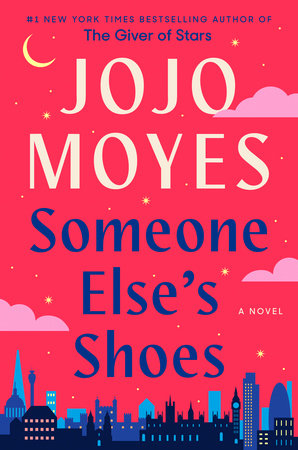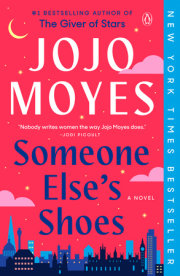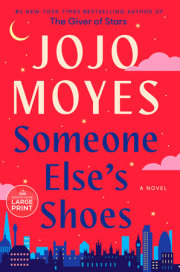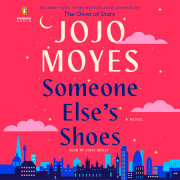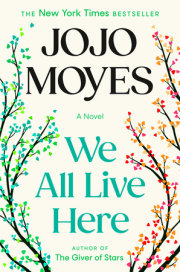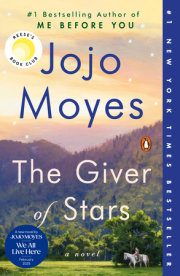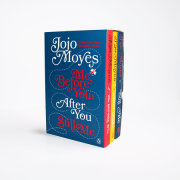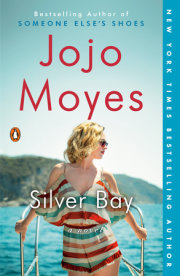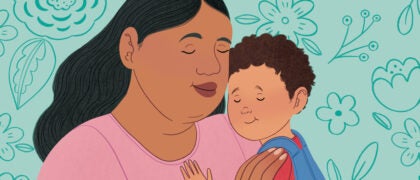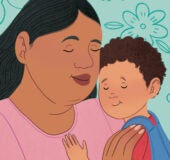one
Sam stares up at the slowly lightening ceiling and practices her breathing, like the doctor advised her, as she tries to stop her 5 a.m. thoughts congealing into one enormous dark cloud above her head.
In for six, hold for three, out for seven.
I am healthy, she recites silently. My family is healthy. The dog has stopped that weeing-in-the-hall thing. There is food in the fridge and I still have a job. She slightly regrets putting in that still because the thought of her job makes her stomach clench again.
In for six, hold for three, out for seven.
Her parents are still alive. Although admittedly it can be hard to justify including that in a mental gratitude diary. Oh, Jesus. Her mother is going to make some pointed comment on Sunday about how they always visit Phil's mother, isn't she? It will come at some point between the small sherry and the over-heavy pudding, as inevitable as death, taxes and these random chin hairs. She imagines fending her off with a polite smile: Well, Mum, Nancy has just lost her husband of fifty years. She's a bit lonely just now.
But you visited her all the time when he was still alive, didn't you? she hears her mother's response.
Yes, but her husband was dying. Phil wanted to see his dad as much as possible before he shuffled off this mortal coil. We weren't having a bloody knees-up.
She realizes she is having another imaginary argument with her mother, and pulls it back, trying to put the thought into a mental box, like she read in an article, and place an imaginary mental lid on it. The lid fails resolutely to shut. She finds she has a lot of imaginary arguments, these days: with Simon at work, with her mother, with that woman who pushed in front of her at the checkout yesterday. None of these arguments ever leave her lips in real life. She just grits her teeth. And tries to breathe.
In for six, hold for three, out for seven.
I am not living in an actual war zone, she thinks. There is clean water in the taps and food on the shelves. No explosions, no guns. No famine. That's got to be something. But thinking about those poor children in war zones makes her eyes prickle with tears. Her eyes are always prickling with tears. Cat keeps telling her to go and get HRT but she still has periods and occasional hormonal spots (how is that fair?) and, anyway, there is no time to book a doctor's appointment. The last time she rang they didn't have a single one available for two weeks. What if I was dying? she had thought. And had an imaginary argument with the doctor's receptionist.
In real life, she simply said: "Oh, that's a bit far off. I'm sure I'll be fine. Thanks anyway."
She glances to her right. Phil is slumbering, his face troubled even in sleep. She wants to reach over and stroke his hair, but lately when she does that he jumps awake, looking startled and unhappy, as if she has done something cruel.
She folds her hands in front of her instead and tries to adopt a relaxed, even pose. Rest is as good as sleep, someone once told her. Just clear your thoughts, and let your body relax. Let your limbs release any tension they're holding, from the toes up. Let your feet grow heavy. Let that feeling travel slowly up to your ankles, your knees, your hips, your stom-
Ah, fuck it, says the inside of her head. It's a quarter to six. I might as well get up.
“There’s no milk,” says Cat. She is staring accusingly at the interior of the fridge, as if waiting for some to materialize.
"You could run to the shop?"
"I haven't got time," Cat says. "I have to do my hair."
"Well, I'm afraid I haven't got time either."
"Why?"
"Because I'm going to that gym and spa you bought me a day pass for. Bodyworks. It expires tomorrow."
"But I gave you that a year ago! And surely you'll only get a couple of hours in there if you're going to work."
"I've arranged to go in a bit late. At least it's right near the office. I just haven't had any time." She never has any time. She says it like a mantra, along with "I'm so tired." But nobody has any time. Everybody is tired.
Cat raises her eyebrows. For her, self-care is a necessity, coming before the more prosaic needs of money, housing and nutrition.
"I keep telling you, Mum, use it or lose it," says Cat, who eyes her mother's increasingly indistinct hip-to-waist ratio with barely concealed horror. She closes the fridge. "Ugh. I just don't know why Dad can't even buy a carton of milk."
"Leave him a note," she says, gathering her things. "Maybe he'll be feeling better today."
"And maybe monkeys will fly out of my butt."
Cat stalks out of the kitchen in the way that only a nineteen-year-old young woman can. A few seconds later Sam can hear the furious roar of her hairdryer and knows that it will be left in Cat's room until she retrieves it.
"I thought you didn't drink cow's milk any more, anyway," she shouts up the stairs.
The hairdryer stops briefly. "Now you're just being annoying," comes the response.
She locates her swimsuit at the back of the drawer and shoves it into her black kitbag.
She is peeling off her wet swimsuit when the yummy mummies arrive. Glossy and stick thin, they swiftly surround her, talking loudly and across each other, their voices filling the fuggy silence of the changing room, completely oblivious to her presence. Sam feels the brief equilibrium gained by her twenty-length swim evaporating like mist. It has taken her an hour here to remember that she hates these places: the apartheid of hard bodies, the corners where she and the other lumpy people try to hide. She has walked by this place a million times and wondered whether to go in. She realizes that these are the kind of women who leave her feeling worse than if she’d never come in at all.
"Are you going to have time for coffee afterward, Nina? I thought we could go to that lovely café that opened up behind Space NK. The one with the poke bowls."
"Love to. Got to be away by eleven, though. I'm taking Leonie to the orthodontist. Ems?"
"Oh, God, yes. I need some girl time!"
These are women with designer athleisure, perfectly cut hair, and time for coffee. These are women whose kitbags bear designer labels, rather than her fake Marc Jacobs knock-off, and have husbands called Rupe or Tris, who carelessly toss envelopes containing hefty bonuses onto shining Conran Shop kitchen tables. These women drive huge off-roaders that never get muddy, double-park their way through their day and demand babyccinos for querulous children from harassed baristas, tutting when they are not made to their exact specification. They do not lie awake until 4 a.m. worrying about electricity bills, or feel sick about greeting their new boss with his shiny suit and his barely disguised disdain each morning.
They do not have husbands who stay in their pajama bottoms till midday and look hunted whenever their wives mention maybe having another go at that job application.
Sam is at that age, the age where all the wrong things seem somehow to stick, fat, the groove between her eyebrows, anxiety, while everything else-job security, marital happiness, dreams-seems to slip effortlessly away.
"You have no idea how much they've put up the prices at Le Méridien this year," one of the women is saying. She is bent over, toweling her expensively tinted hair. Sam has to wiggle sideways to avoid touching her.
"I know! I tried to book Mauritius for Christmas-our usual villa's gone up by forty percent."
"It's a scandal."
Yes, it's a scandal, she thinks. How awful for you all. She thinks of the camper-van that Phil bought two years ago to do up. "We can spend weekends by the coast," he had said cheerfully, eyeing the huge van now blocking their driveway with its giant sunflower on the side. He never got beyond replacing the back bumper. Since his Year of Carnage, it has sat in front of their house, a nagging, daily reminder of what they have lost.
Sam wriggles into her knickers, trying to hide her pale flesh under the towel. Today she has four meetings with important clients. In half an hour she will meet Ted and Joel from Print and Transport, and they will try to win their company some vital business. And she will try to save her job. Maybe all their jobs.
No pressure there, then.
"I think we're going to do the Maldives this year. You know, before they sink."
"Oh, good idea. We loved it. Such a shame, the whole sinking thing."
Another woman pushes past Sam to open her locker. She is dark-haired, like Sam, maybe a few years younger, but her body has the toned look of someone for whom hard exercise, moisturizing and buffing are daily occurrences. She smells expensive, like it actually oozes from her pores.
Sam pulls her towel tighter around her pale, dimply skin and disappears around the corner to dry her hair. When she returns, they have all gone. She breathes a sigh of relief and slumps onto the damp wooden bench. She thinks she might just go and lie down on one of the heated marble beds in the corner for half an hour. The thought fills her with sudden pleasure: a half-hour of just lying there in blissful silence.
Her phone buzzes in her jacket, hanging in the locker behind her. She reaches into her pocket and pulls it out.
You ready? We're outside.
What? she types. We're not due at Framptons till this afternoon.
Didn't Simon tell you? It got moved up to 10. Come on-we need to leave.
She glances at her phone in horror. This means she is apparently due at the first meeting in twenty-three minutes. She groans, wriggles into her trousers, sweeps the black kitbag from the bench, and stomps off toward the car park.
The dirty white van with grayside print solutions on the side is waiting by the loading doors, engine idling. She half runs, half shuffles toward it in the gym flip-flops. She will return them tomorrow but already feels guilty, as if she’s committed some major transgression. Her hair is still damp and she is puffing slightly.
"I think Simon's gunning for you, sweetheart," says Ted, as she climbs into the van. He shuffles up the front bench seat to make room for her. He smells of cigarette smoke and Old Spice.
"You think?"
"You want to watch him. Double-check all the meeting times with Genevieve," says Joel, wrenching the steering wheel around. His dreadlocks are pulled back into a neat ponytail, as if in deference to the day ahead.
"It's just not the same since they took over, is it?" says Ted, as they pull onto the main road. "Feels like we're walking on eggshells every day."
There are two empty, sugar-strewn paper bags on the dashboard, and Ted hands her a third, containing a huge, still-warm jam doughnut.
"There you go," he says. "Breakfast of champions."
She should not eat it. It contains at least twice as many calories as she has just burned off swimming. She can hear Cat's sigh of disapproval from here. But she hesitates, then stuffs it into her mouth and closes her eyes at the warm, sugary comfort. These days, Sam takes her pleasures where she can.
"Genevieve heard him talking on the phone about redundancies again," says Joel. "She says when she walked into his office he changed the subject."
Every time she hears "redundancy," a word that now flutters around the office like a trapped moth, her stomach clenches. She doesn't know what they will do if she loses her job too. Phil is refusing to take the anti-depressants the doctor prescribed. He says they make him sleepy, as if he doesn't sleep most days till eleven anyway.
"It won't come to that," says Ted, unconvincingly. "Sam's going to bring in the business today, aren't you?"
She realizes they're both looking at her. "Yes," she says. And then, more positively, "Yes!"
She does her makeup in the small vanity mirror, cursing quietly every time Joel goes over a bump, and rubbing off the resulting smudges with a licked finger. She checks her hair, which has not dried too badly, all things considered. She flicks through the file of paperwork, making sure she has all the figures at her fingertips. She has a vague memory of when she felt confident about all this stuff, when she could walk into a room and know that she was good at her job. Come on, Sam, just try to be that person again, she tells herself silently. And then she slips her feet out of the flip-flops and reaches into her kitbag for her shoes.
"Five minutes away," says Joel.
It is only then she realizes that although the kitbag looks like hers it is not hers. This bag does not contain her comfortable black pumps, suitable for pounding pavements and negotiating print deals. This bag contains a pair of vertiginous red crocodile-skin Christian Louboutin slingbacks.
She pulls out a shoe and stares at it, its strappy, unfamiliar weight dangling in her hand.
"Blimey," says Ted. "Is the first meeting at Stringfellows?"
Sam bends down and rifles through the bag, coming up with the other shoe, a pair of jeans and then a neatly folded pale Chanel jacket.
"Oh, my God," she says. "This isn't mine. I've picked up the wrong bag. We have to go back."
"No time," says Joel, staring straight ahead at the road. "We're pushing it already."
"But I need my bag."
"Sorry, Sam," he says. "We'll go back later. Wear what you wore to the gym?"
"I can't wear flip-flops to a business meeting."
"Wear the shoes that are in there?"
"You're kidding me."
Ted takes the shoe from her. "She has a point, Joel. Those shoes aren't very . . . Sam."
"Why? What's very 'me'?"
"Well. Plain. You like plain stuff." He pauses. "Sensible stuff."
"You know what they say about shoes like that," says Joel.
"What?"
"They're not for standing up in."
They nudge each other, chuckling.
Sam snatches the shoe back from him. It's half a size too small. She eases her foot into it and fastens the strap.
"Great," she says, looking at her foot. "I get to pitch to Framptons looking like a call-girl."
Copyright © 2023 by Jojo Moyes. All rights reserved. No part of this excerpt may be reproduced or reprinted without permission in writing from the publisher.




